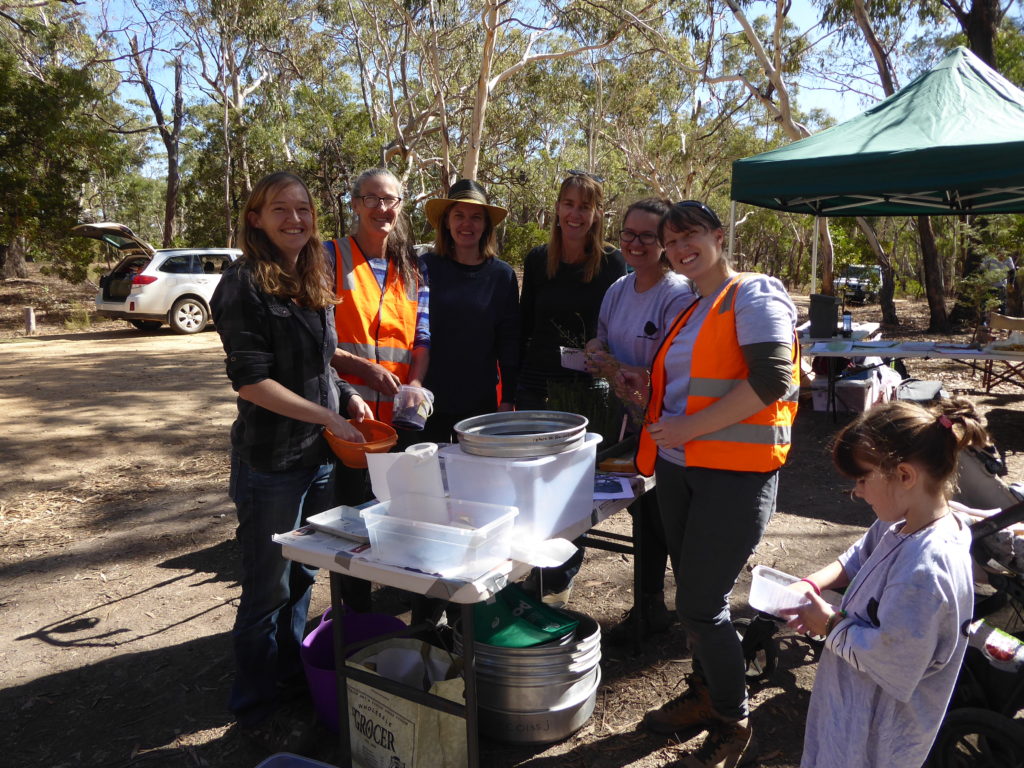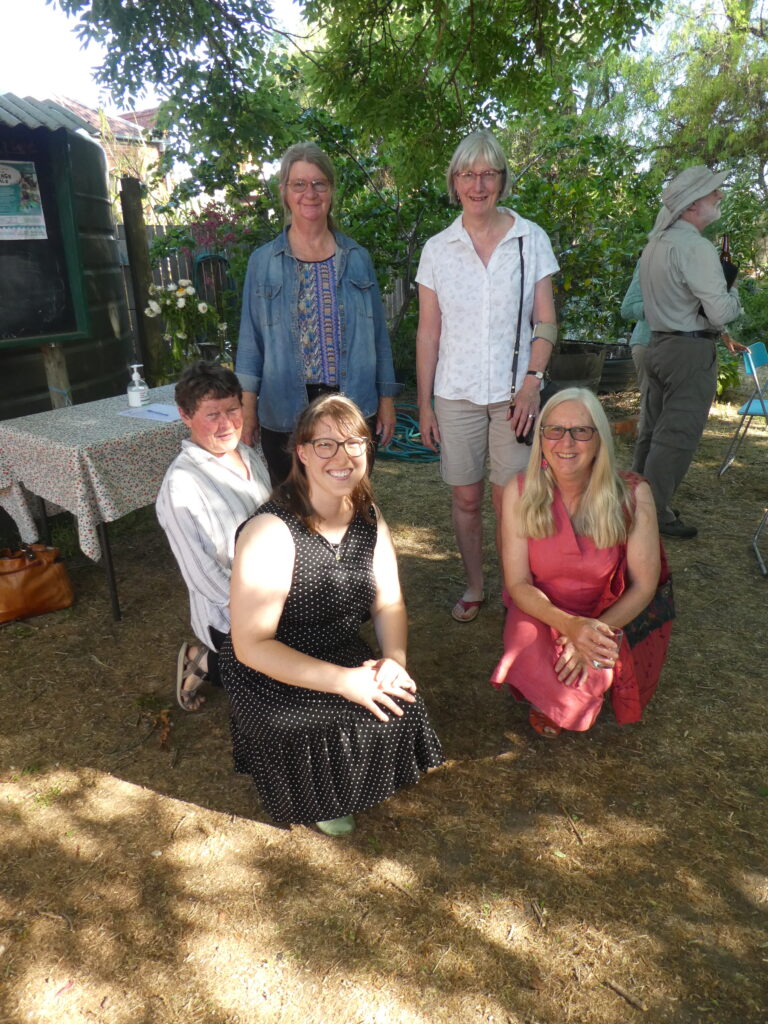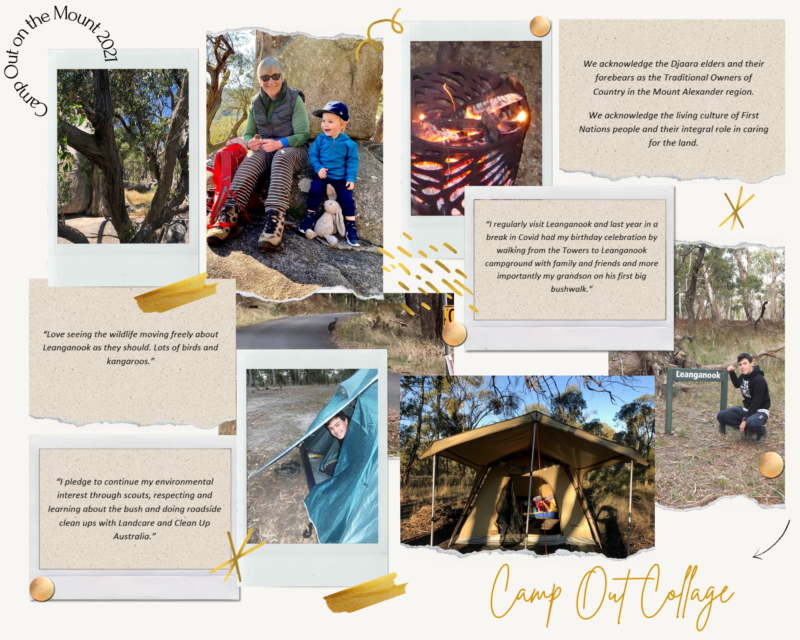Adapting to climate change impacts with Campaspe Valley Landcare
Posted on 17 February, 2022 by Ivan
In conjunction with the Upper Campaspe Landcare Network (UCLN), Campaspe Valley Landcare Group are hosting a free presentation on Adapting to the impacts of Climate Change.
Dona Cayetana – Community and Partnerships Officer with Department of Environment, Land, Water and Planning – will present at the session on Saturday 26 February 2022 at 3 pm in Redesdale, VIC. Dona will discuss the new Victorian Government initiative designed to empower communities to prepare and adapt to the impacts of climate change set around six Regional Climate Change Adaption Strategies.
The initiative was announced in the January 2022 edition of Southern Farmer by Minister for Energy, Environment, and Climate Change, Lily D’Ambrosio, who stated ‘This is another example of how we’re delivering real action on climate change by supporting communities to deliver their local projects and build thriving and sustainable futures.’
When: Saturday 26 February 2022 at 3.00 pm
Where: Redesdale Hall, Recreation reserve, corner of Lyell Rd and Kyneton-Heathcote Rd, Redesdale VIC
Cost: Free
Topics include:
- Preparing for and recovering from emergencies
- Caring for the natural environment
- Carbon farming
- Citizen science biodiversity monitoring program
- Improving health and well being
- Strengthening the economy
- Clean energy
- Funding possibilities and incentives
Bookings are essential as COVID-safe seating is limited to 50 people. Contact UCLN facilitator, Rebekah, via phone (0432 491 252) or email (ucln@uppercampaspelandcare.org.au), or call Rob ((03) 5425 3258 after 5.30 pm). Please leave your contact details or a message if no one is available to take your call and you will be contacted as soon as possible.
Please stay home if you feel unwell. COVID-19 safety protocols apply at this event.
The wellbeing benefits of being a Landcarer
Posted on 17 February, 2022 by Frances
The Mount Alexander region of central Victoria is blessed with around 30 active Landcare and Friends groups, representing an extremely high level of community involvement in the Landcare movement.
Being a Landcarer can be extremely hard work, but there are also many rewards. There is the satisfaction of contributing to a healthy landscape, and creating habitat for native plants and animals. We also recognise there are benefits from connecting to the land, meeting people, making social connections and learning new skills. New research now shows Landcare can also improve personal wellbeing.
For decades, people involved in Landcare have testified to a greater sense of self, both physically and mentally, resulting from closer links with their local community and environment. This, in turn, has boosted community wellbeing and it has long been the desire of the Landcare movement to quantify the significance of these benefits.
Now, Landcare Australia has published findings by KPMG Australia, indicating Landcare volunteers enjoy substantial improvements to their mental and physical wellbeing – with a significant decrease to their healthcare costs!
Surveying more than 1,000 Landcare volunteers and coordinators from Landcare groups, the findings in the report, titled Building resilience in local communities: The wellbeing benefits of participating in Landcare suggest substantial improvements in wellbeing owing to involvement in Landcare lead to approximate savings from avoided healthcare costs of $403 per individual per year. For the Landcare movement which exceeds 140,000 individuals, that number equates to $57 million nationally.
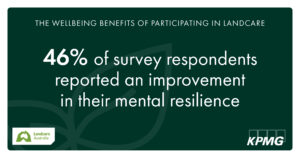
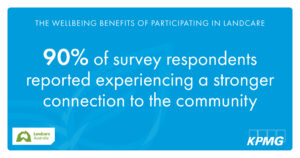
The report goes on to address additional savings to the Landcare volunteer community relating to productivity, and benefits owing to natural disaster resilience and recovery, with the combined value amounting to $191 million annually.
To read the full report – click here
To view Connecting Country’s short video celebrating Landcare in the Mount Alexander region – click here
To get involved in your local Landcare group – click here
For any other questions related to our local landcare groups in the Mount Alexander region, contact Connecting Country’s Landcare Facilitator Hadley – hadley@connectingcountry.org.au
Landcare community day at Muckleford – 6 February 2022
Posted on 2 February, 2022 by Frances
Our friends at Muckleford Catchment Landcare Group are getting ready for their next event and you’re invited!
Please read on for details about the upcoming community day from Muckleford Landcare. They are an active group of people working to conserve and improve the health of the Muckleford Creek catchment, located west of Castlemaine in central Victoria. To learn more about Muckleford Landcare’s activities – click here
Muckleford Landcare Habitat Corridor Project is funded by the Victorian State Government, Community Volunteer Action Grants 2021.The Landcare community day will be on Sunday 6 February 2022, starting at 3 pm. Muckleford Landcare will attempt to install guards around 3,000 plants in the habitat corridor with help from Landcare volunteers. All Landcarers and other community members are welcome to join in, especially if you’ve been missing out on activities during the last couple of years.
A vegetarian BBQ will be provided for dinner, as I’m hoping we can work until dusk. There will be free booklets and guides available at the information table, and food and drinks will be provided. Meet the landowners and take part in the project story-telling.
Entry to the property is along the Muckleford School Road, opposite the Muckleford Bushland Reserve in Muckleford VIC – look out for the Landcare banner.
Please RSVP to Beth Mellick for catering purposes – click here

Ready for planting (photo by Muckleford Landcare)

Preparing plant guards (photo by Muckleford Landcare)
Gypsy and Anusheh raise money for Connecting Country!
Posted on 12 January, 2022 by Ivan
Gypsy and Anusheh, both in Grade 3 at Violet Street Primary School in Bendigo VIC, held a fundraiser for Connecting Country in November 2021. The girls did a fantastic job of arranging a lucky dip that cost 50 cents per dip. It was so successful they had 204 dips in the basket, which saw a line-up of students waiting for their turn, and raised an impressive total of $104!
The Connecting Country team are so proud to know these young advocates for our natural landscape. Connecting Country’s Landcare Facilitator, Hadley, interviewed the girls to find out what inspired them and what they love most about their local natural environment.
Q. What inspired you both to hold a fundraiser for Connecting Country?
Gypsy – I really like birds and native plants and basically native everything. We live in the sort of place where there is lots of native birds and stuff that I can look around at and like, and that kind of inspired me.
Anusheh – Well we get to see a lot of birds at our place. So I like the birds because they look pretty and when we go for walks I like how they sing and all of the different tress that they can go into.
Q. What do you love most about the natural environment where you live?
Anusheh – It’s probably the birds that I can see just sitting out the window in the trees and I can just look at them.
Gypsy – I like waking up to chirping birds making all different songs, it’s really relaxing. And going on walks seeing native plants, it’s really relaxing. We live on the Bendigo Coliban Water chase and there are lots of birds around the chase.
Q. What inspires you to look after and protect our landscapes and environment across Central Victoria?
Gypsy – I knew that Connecting Country would be the right place because they help lots of native things like native birds and native plants and native animals, and they’re really good with it. It’s important to me because I really like animals and I really like birds and I really think they should have a habitat just like we do.
Anusheh – When I got a dog she kept finding these dead birds around our house but we know she can’t catch them because she’s still a bit young to catch them. So I thought if I can help them [the birds] I think it would help and my dog won’t catch as many birds and maybe be a bit kinder to birds.
Q. What do you know about Landcare?
Gypsy – I know that my Dad is the Vice President of our local Landcare. I’ve also been to Camp out on the Mount.
Q. Who are your role models?
Anusheh – I think it would probably be my parents, my teachers and some of my friends.
Gypsy – Asha [former Connecting Country staff member], because she’s really passionate, kind, funny, nice and I helped her at Camp out on the Mount, and my Dad.
Q. What do you hope to achieve when you grow up?
Gypsy – To be part of helping stopping climate change and the greenhouse effect, which is probably the worst effect you can get.
Anusheh – Probably to help so there won’t be as much plastic just floating around.
Q. What is your favourite bird or other animal?
Anusheh – Probably a Kookaburra
Gypsy – My favourite animals are sharks, snakes, and my favourite birds, I’ve got a lot. I can’t say all of them but a Red-tailed Black Cockatoo, a Yellow-tailed Black Cockatoo, a Long-billed Corella and a Short-billed Corella, Powerful Owl, Diamond Firetail, a Wedge-tailed Eagle and a thousand more!
The Connecting Country team send Gypsy and Anusheh a big thank you for their amazing efforts, and for taking the time to answer the interview questions. What wonderful initiative and commitment they have shown. Well done girls!
Farewell Asha and welcome Hadley: a new Landcare Facilitator
Posted on 3 November, 2021 by Ivan
We recently said ‘goodbye’ to our much-loved Landcare Facilitator, colleague and friend, Asha Bannon. Asha has been an incredible asset to Connecting Country over the past (nearly) six years. She has provided inspiration and dedication to the role of Landcare Facilitator for the Mount Alexander region, and will be missed by the 30+ local groups who shared in her passion, vision and wisdom. Her commitment to the groups was a juggling act, with Asha often attending multiple events over a single weekend. Asha’s efforts have made a huge difference to the local landscape and the Landcare community.
We wish Asha the very best in her new role at North Central Catchment Management Authority, and are thrilled she will stay involved as a Connecting Country volunteer and supporter. Thanks also to all the Landcarers who have supported Asha during this time.
As one-star moves to another galaxy, another arrives. We have been very fortunate to recruit a new Landcare Facilitator – another local talent – Hadley Cole. We welcome Hadley with open arms and endless Zoom calls, and hope she enjoys the role and the team, as we regroup after a lengthy COVID-related ‘home office’ period.

Local resident Hadley Cole joins Connecting Country with a wealth of knowledge in landscape restoration. Photo: Connecting Country
Introducing Hadley
Hadley Cole has lived and worked in Central Victoria for the past ten years. Growing up in North East Victoria, she developed a strong love for nature and a keen interest in agriculture. Her career has spanned multiple environmental management roles with both government and non-government organisations. Hadley has worked with the Victorian Department of Primary Industries, along with community groups such as Wombat Forestcare and Merri Creek Management Committee. She brings an array of skills and knowledge on landscape restoration, invasive species management and how to empower community groups. Her experience gives Hadley a sound knowledge of the key conservation issues within central Victoria.
Hadley lives in Guildford with her young family, and has been actively involved in local community-based projects in the Guildford area. She is passionate about regenerative farming and enjoys spending her time in the garden and in nature with her family.
Hadley is delighted to join the Connecting Country team as Landcare Facilitator for the Mount Alexander region, as she believes strongly in the power of community, and values the knowledge and passion volunteers bring to local conservation projects.
We are super-excited to have Hadley on board, please say hello to Hadley via her email: hadley@connectingcountry.org.au
Please enjoy a few photos of Asha and some of the wonderful events she coordinated over the past few years. Farewell and thank you Asha!
New law gives council powers to enforce weed control
Posted on 7 September, 2021 by Asha
This article was written by local community member and volunteer Lee Mead. Lee has been an active community member and weed warrior for many years and her current roles include President of the Tarrangower Cactus Control Group, founding member of the Friends of Maldon Historic Reserve, and valued supporter of Connecting Country. Lee compiled this article with the aim of helping to raise awareness of a new Local Law in the Mount Alexander Shire.
The new laws will make it easier for the council to prosecute people who don’t control noxious weeds on their properties, as well as increasing the penalties for this infringement.
Thank you Lee and keep up the great work!
One of the positive highlights of 2020 was the endorsement of a new Local Law by the Mount Alexander Shire Council (MASC). The new Clause 19 has been created, which is specific to the control of declared noxious weeds. There is now significantly greater clarity and priority in our Shire’s Local Law given to the management of noxious weeds, which harm the environment and agriculture.
The new Clause 19, titled ‘Control of Noxious Weeds’, gives much greater definition, clarity and interpretation to the impacts and issues of weeds. It includes a definition of ‘noxious weeds’ and reference to the Victorian Catchment and Land Protection Act 1994 (CaLP Act) and the Catchment and Land Protection Regulations 2012. In addition, the penalty for non-compliance has been doubled, from 5 to 10 penalty points.
The definition of noxious weeds (in the Local Law and the CaLP Act) refers to weeds that are a:
- State prohibited weed or
- Regionally prohibited weed or
- Regionally controlled weed or
- Restricted weed.
For more information on noxious weeds and their management – click here
These Local Law changes will raise the status and significance of noxious weed control in our Shire and reduce the ambiguity that the previous sub-clause created. The new clause will provide the Shire’s Bylaw Officers with a clearer definition of noxious weed management and hopefully result in increased enforcement action with non-compliant property owners. This new and specific ‘noxious weed’ clause will be more effective by making it easier for ratepayers to seek assistance from MASC Bylaw Officers to enforce weed control actions by absentee property owners, who are sometimes unaware of their legal weed control responsibilities.
We will be watching with a keen eye to see if any compliance infringements are issued under this local law over the coming year.
Lee Mead

Gorse is a declared noxious that can take over valued farmland and environmental assets (photo by Victorian Gorse Task Force)
Landcare Facilitator role with Connecting Country
Posted on 24 August, 2021 by Frances
We are incredibly sad to be saying farewell to our much-loved Landcare Facilitator, Asha Bannon, in a few weeks. At the same time, we’re excited that Asha is taking on a brand new role with North Central Catchment Management Authority, and will stay part of the Connecting Country family as a valued member, volunteer and supporter.
This means we’re now recruiting for a new Landcare Facilitator to join the Connecting Country staff team.
Landcare Facilitator – Mount Alexander region
We have an exciting opportunity for a hardworking person with experience in natural resource management and community groups to join our established community-run organisation. Connecting Country works with landholders and community groups to restore landscapes across the Mount Alexander Region of central Victoria, on both public and private land. Further information about our work is available on our website (connectingcountry.org.au).
The Landcare Facilitator is responsible for supporting around 30 active Landcare and environmental volunteer groups within the Mount Alexander region to build their capacity and resilience. We are looking for someone who is approachable, organised, and passionate about helping Landcare groups and other volunteers to achieve their goals to protect, enhance and restore the land and natural environment.
This is a part-time role (three days per week) based in Castlemaine, Victoria. It is a 12-month contract position, with contract extension subject to performance and funding availability.
We seek someone who can:
- Share a passion for supporting Landcare and community groups in the Mount Alexander region.
- Engage and communicate effectively with people from a range of backgrounds in an open and friendly way.
- Write clearly and concisely, and communicate complex concepts in simple language.
- Work both independently and collaboratively as part of a team.
- Plan and manage project activities, budgets and schedules.
- Manage time and workload, coordinating multiple tasks simultaneously to meet deadlines.
- Be responsible, self-motivated, reliable, adaptable and solution-focussed.
- Exercise good judgment, make ethical decisions and set priorities.
- Contribute as part of the Connecting Country team.
- Use Microsoft Office and other relevant software.
- Drive a manual four-wheel drive vehicle (with training if required).
- Be flexible as the situation demands, including working outside normal work hours on occasion.
How to apply
For further details about the role including full position description and preferred skills – click here
If you have any questions, please email Frances at info@connectingcountry.org.au (available Monday to Thursday).
Please provide your written application by email to info@connectingcountry.org.au, including a brief application letter summarising your suitability for the role and curricula vitae demonstrating your relevant skills and experience.
To learn more about Landcare in the Mount Alexander region, watch our new Landcare celebration video! – click here
Hot off the press: Healthy Landscapes guide
Posted on 11 August, 2021 by Ivan
It has been nearly a year in the making, and we are super-happy to announce that Connecting Country’s Healthy Landscapes guide has arrived fresh from the printers! And, it looks amazing (in our humble opinion!). The 44-page guide has been developed to assist our local farmers and landholders to manage their land for multiple outcomes, benefiting wildlife, property and landscape health. It is targeted to the Mount Alexander region of central Victoria, which makes it unique to our special local area. It forms part of Connecting Country’s Healthy Landscapes project, a Smart Farms project that delivers a series of educational workshops and a land management guide for landholders.
The Healthy Landscapes guide provides background context on our region’s natural assets, as well as eight concise sections on actions landholders can take to protect and restore habitat on their properties in central Victoria.
Topics included in the guide are:
- Protecting remnant vegetation.
- Make a plan.
- Control weeds.
- Control rabbits.
- Revegetate your land.
- Help hollow-using wildlife.
- Manage your dam as habitat.
- Care for paddocks.

The guide features a variety of stunning images, such as these on the front cover from Bronwyn Silver (bush sunset), Jane Satchell (gnarly wood) and Geoff Park (Yellow-footed Antechinus).
‘Landholders often ask us about where they can find information relevant to our region on how to manage their land to benefit the environment and farming,’ said Jacqui Slingo (Landscape Restoration Coordinator at Connecting Country). ‘We are thrilled to have produced a guide that allows landholders, especially the many new property owners in our region, to get started with caring for their property by protecting native vegetation and wildlife habitat through actions like weed and rabbit control.’
We would like to send a huge thanks to the many wonderful contributors in our community, including photographers, volunteer reviewers and experts who generously contributed their time and talents to the guide. Thank you! Thanks also to Jane Satchell, who illustrated and designed visual aspects of the guide, and led us through the layout process through to printing.
Connecting Country would like to thank the Department of Agriculture, Water and the Environment, through funding from Australian Government’s National Landcare Program, for supporting this project.
Copies of the guide will be offered to Landcare and community groups, and available for general sale (around $15 per copy) in Castlemaine through the Castlemaine Visitor Information Centre, Stoneman’s Bookroom and Mount Alexander Animal Welfare (MAAW) Op Shop. Please do not hesitate to contact us if you have any questions, or would like further information.
To read more about the Healthy Landscapes project – click here
Landcare Week: 3-9 August 2021
Posted on 5 August, 2021 by Ivan
National Landcare Week
Throughout the first week of August, Landcare Week celebrates the tireless efforts and commitment of volunteers who help to maintain and restore our natural environment. In its 30-year anniversary this year, Landcare Week provides an opportunity for people to come together and learn more about Australia’s environment to help take care of our most precious resource. The annual Landcare Week campaign celebrates and acknowledges the thousands of Landcare networks and groups, facilitators, and other environmental care community groups, and volunteers across Australia working on conservation and sustainable land management activities in their local area.
From 3-9 August 2021, Landcare week will be aiming to raise awareness of all the vital environmental work being done across the country and to get people involved with taking care of our natural resources. It doesn’t take much to participate in Landcare Week and help make a positive difference. There are plenty of ways to contribute that don’t take up a lot of time.
Here are six ways to get involved with Landcare Week, courtesy of Landcare Victoria:
- Plant native trees, shrubs and grasses to create habitat for native animals to improve biodiversity.
- Put a birdhouse or nesting box for different species in your backyard. Every animal needs a home!
- Ensure your dog is kept on a leash when near bushland and keep your cat inside overnight as they often hunt birds and other small native mammals.
- Avoid chemical pesticides and herbicides in your garden to help protect bees and insects and use natural alternatives instead.
- If you can’t reuse or re-purpose an item, try to recycle it to reduce pollution. Many household groceries still come in soft plastic wrapping. Most supermarkets will recycle these for you if you bag them up and bring them with you the next time you go to the shops.
- Use public transport or riding a bike instead of driving to reduce your carbon footprint. Or if it’s necessary to drive to work, try to organise a carpool.

Revegetation of degraded woodlands is a common theme of our local Landcare projects over the past decade (photo: Gen Kay)
National Landcare Conference and Awards: Virtual event (courtesy of Landcare Australia)
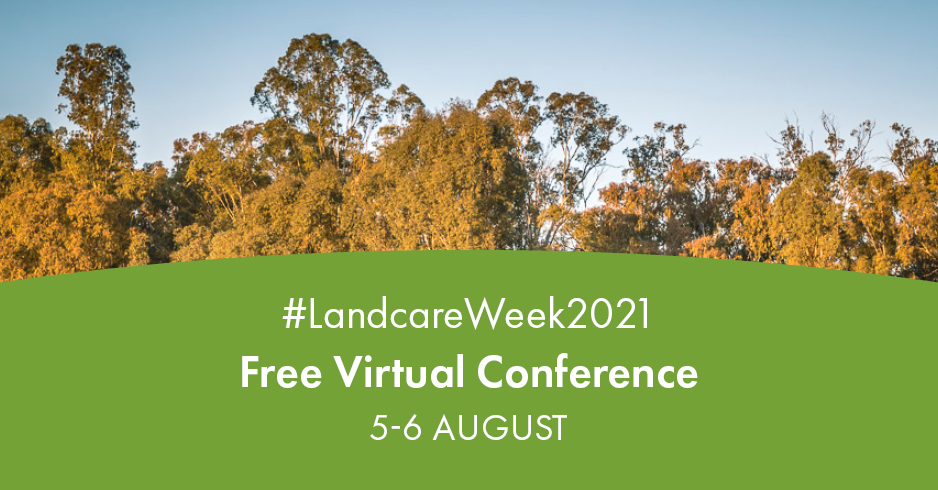
The feature of this year’s Landcare Week celebration is the gathering of thousands of landcarers from across the nation, joining together at the virtual 2021 National Landcare Conference and Awards events to share the latest innovations, technologies and tangible ideas to take action on.
From Australia’s biggest cities or the most rural locations, anyone can participate as a free online delegate on Thurs and Fri, 5-6 August 2021.
The program comprises a diverse range of over 60 speakers from the landcare community, government representatives and academics in 40 sessions across the four conference streams: Sustainable Agriculture; Environment and Climate Change; Community Partnerships in Action; and Landcare Impact. Delegates will also have the opportunity to attend the following panel discussions:
- Landcare Farming: Landcare and farming, is the connection still valued?
Bushfire Recovery and Resilience: Landcare’s role in recovery of communities, natural assets and farms after bushfire events. - Wellbeing and Mental Health Panel: Landcare Is ALL about trees right?
- Cultural Land Management Panel: Integrating Indigenous Perspectives for better land management.
The conference will be live streamed and recorded, so attendees can dip in out and catch-up later. Free registration provides access to the National Landcare Awards presentation, educational resources and more.
Landscape architect, environmental educator and television presenter with an all-consuming passion for plants and people, Costa Georgiadis is the MC for the events. Costa is a long-time champion of landcare and also a Junior Landcare Amabassador.
Author, filmmaker and Indigenous fire practitioner, Victor Steffensen will be a special guest speaker along with Barry Hunter, for an engaging talk on Country, sharing the advantages and benefits that embracing cultural burn methods can bring to help the Landcare community tackle climate change. The panel will include a conversation on how farmers and landowners can get started and have conversations with Traditional Owners. The Cultural Land Management panel has been scheduled at a very special time of Friday afternoon to close the conference along with young landcare leader and Kalari Wiradjjuri woman, Dhani Gilbert.
A highlight of the conference program is the 2021 National Landcare Awards to celebrate the 69 finalists from the 2019 State & Territory Landcare Awards, where winners of the nine National Landcare Awards categories will be announced. The winners of the Bob Hawke Landcare Award and the General Jeffery Soil Health Award will also be announced.
Lets celebrate our region’s wonderful Landcare: new video launched
Posted on 29 July, 2021 by Ivan
We love our Landcare community! We are forever grateful for the restoration and revegetation projects Landcare and Friends groups have achieved over the past decades and all of the volunteers hours they dedicate to our natural landscape. This needs to be celebrated!
Connecting Country is excited to announce that we have recently completed our ‘Landcare Celebration’ video, a tribute to our hardworking and passionate groups across the Mount Alexander region in central Victoria.
The video features a number of Landcare volunteers talking about why Landcare is important to our community and the vast diversity of projects across our region. Landcare is for everyone, including the natural landscape and all its diversity, and is a great way to meet your neighbours and make new friends.
We could have made a few full-length movies about our wonderful Landcare groups if the budget was unlimited, but we have had to settle on a 5-minute video. We also have a shorter version of the video, for promotion and social media.
To watch the full 5-minute version of the Landcare Celebration video, please click here.
To watch the 1-minute version of the Landcare Celebration video, please click here.
(Please note that we are hoping to add subtitles as soon as we can.)
“I have seen first-hand what community groups can achieve and the real difference they make on the ground every day,” says Asha Bannon, Mount Alexander Region Landcare Facilitator. “We hope that this video will give our broader community a snapshot of the opportunities that Landcare can give you to help care for our precious local environment, while also having some fun!”
The video would not have been possible on our budget without co-sponsorship from our favorite film-media company, MRL Media, who have generously funded part of the video production. We really enjoyed working with Steve and his team on the development and production and would like to thank them for helping us out make this project happen with professional outcomes.
This project was funded through the Mount Alexander Shire Council Community Grants Program, which contributed to the costs associated with making the video, as well as some hours for our amazing Community Engagement Coordinator, Ivan Carter.
Connecting Country would like to say a heartfelt thank you to the many community members who played crucial roles in making this video special, including Beth Mellick, Uncle Rick Nelson, Ian Higgins, Marie Jones, Drew Marshall, Jane Rusden, Brian Bainbridge, and the Landcare Steering Group.
Landcare in our region
Landcare is about caring for your land and your local area so it continues to support our community and natural resources for generations to come. This volunteer movement began in Victoria in 1986 and there are now more than 600 Landcare Groups in Victoria, with around 30 in the Mount Alexander region surrounding Castlemaine.
Landcare and Friends Groups care for our land through practical actions like revegetation, weed and pest control, erosion control, improving water quality, and helping farmers be more sustainable. They also engage and support community members through workshops, interpretive signs, recording history, building walking tracks, and more.
Get involved
Joining a Landcare or Friends group is a great way to actively help your local environment and get to know local people. You can get involved at any level, from dropping in to a working bee occasionally to taking a management role.
Visit the Landcare page on our website to learn more about local Landcare and how to contact your nearest group – click here
Platypus mysteries to be revealed – Baringhup Landcare Group
Posted on 15 July, 2021 by Asha
See below information about Baringhup Landcare Group’s exciting upcoming event with the Australian Platypus Conservancy:
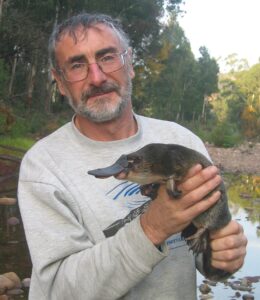 The platypus is one of the world’s most amazing animals. This furry, warm-blooded mammal lays soft-shelled eggs like a lizard, uses its bill to navigate underwater, and sorts out arguments with the help of venomous spurs. The platypus is also among the most popular of Australia’s animal icons – a great flagship species for freshwater conservation. But what about the platypus’s own environmental needs? How is the species faring in the wild? And what needs to be done to ensure that populations survive in our local rivers and creeks?
The platypus is one of the world’s most amazing animals. This furry, warm-blooded mammal lays soft-shelled eggs like a lizard, uses its bill to navigate underwater, and sorts out arguments with the help of venomous spurs. The platypus is also among the most popular of Australia’s animal icons – a great flagship species for freshwater conservation. But what about the platypus’s own environmental needs? How is the species faring in the wild? And what needs to be done to ensure that populations survive in our local rivers and creeks?
Baringhup Landcare Group has arranged for Geoff Williams from the Australian Platypus Conservancy to share his knowledge of this amazing monotreme on Tuesday 3 August 2021 at Baringhup Community Hall starting at 7.00pm. Visitors are welcome. Bookings essential (see below).
Geoff will highlight the features that make the platypus so special, explain its conservation needs and how to go about helping these animals. He’ll then give some hints on how to spot platypus in the wild and outline the possibilities of becoming involved in ‘citizen science’ programs to monitor local populations.
Geoff Williams has been studying platypus since 1994 when he helped found the Australian Platypus Conservancy, an organisation dedicated to researching platypus conservation needs. Prior to his work with the APC, Geoff was Director of Healesville Sanctuary for five years from 1988 to 1993 and, before moving to Victoria, was Assistant Director of Sydney’s Taronga Zoo from 1985 to 1988. Geoff has presented numerous public talks on platypus at venues throughout Australia, including various universities, the National Museum in Canberra and the Melbourne Museum (on behalf of Australian Geographic).
Please note: To help manage COVID restrictions please booking via www.trybooking.com/BSPNW or contact Di Berry using the details below. COVID limits and regulations will apply. Bookings essential.
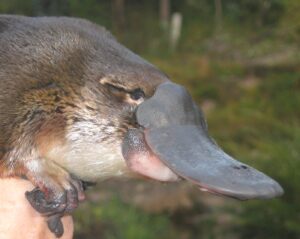 For further information, please contact:
For further information, please contact:
Baringhup Landcare:
Diane Berry (Sec) 0403 020 663
Email: dianejberry@hotmail.com
Australian Platypus Conservancy:
Geoff Williams 03 5416 1478/0419 595939
Email: platypus.apc@westnet.com.au
Waterwatch volunteers wanted for Forest Creek
Posted on 2 June, 2021 by Asha
Since 2006, dedicated volunteers have surveyed water quality along Forest Creek in Castlemaine VIC every month. They monitor waterway health using methods outlined by the Waterwatch citizen science program. At the recent Castlemaine Landcare Group AGM, volunteer Matt Kennedy gave a report on Waterwatch findings along Forest Creek, and invited anyone interested in volunteering for this worthy cause to get in touch.
‘We take turns to monitor four sites monthly on Forest Creek, simple chemistry and water meters used with visual observations and data loaded into a public database for use by scientists and for catchment management,’ says Matt. ‘A monitoring session takes about 2-3 hours but is quicker as you get familiar with it. Training is provided by current volunteers and North Central CMA, with regular check-ins by the CMA to maintain quality assurance.’
Become a waterwatch volunteer
If you are interested in becoming a Waterwatch volunteer with Castlemaine Landcare Group, contact Matt Kennedy (email: migalake33@gmail.com)
If you are interested in becoming a Waterwatch volunteer elsewhere in the Mount Alexander region, contact your nearest Landcare or Friends group. To find your group, contact Connecting Country’s Landcare Facilitator, Asha Bannon (email: asha@connectingcountry.org.au ) or visit our website – click here
To learn more about Castlemaine Landcare Group – click here
To learn about the North Central WaterWatch Program, visit the North Central Catchment Management Authority website – click here
Camp Out Collage 2021
Posted on 13 May, 2021 by Asha
Thank you to everyone who contributed to the ‘Camp Out Collage’ as part of our virtual 2021 Camp Out on the Mount. Special congratulations to our prize winners – Theo, Dale, Lynda, Liz, and Eliza!
The collage is made up of photos from camping, pledges to care for the land, and words of love for Leanganook.
Photos and words from Theo Mellick-Cooper, Dale Every, Lynda Conn, Liz Martin, Eliza Alford, Asha Bannon, Frances Howe and Bronwyn Silver.
The Camp Out on the Mount pages will remain on our website for those who would like to continue exploring them – click here
What is Landcare and how do I get involved?
Posted on 22 April, 2021 by Ivan
Most people in our region may have heard of Landcare, and recognise the iconic logo of two hands forming the shape of Australia, but what is Landcare? We thought it was a good time to explain what Landcare is, why do they do what they do, and how to get involved in the central Victorian region.

McKenzie’s Hill Action & Landcare Group volunteers planting 100 prickly plants for habitat (photo by Sylvia Phillips)
At its heart, Landcare is about caring for your land and the land in your local area so that it will support our society and maintain our natural resources for generations to come. Depending on where you live that might mean looking after your farm, nature strip, local bush reserve, beach – all kinds of land. Through Landcare, individuals and communities get the support, knowledge and resources necessary to do this work.
Connecting Country has been busy over the past month planning a Landcare Celebration video, so stay tuned for this. It will explain some of our achievements, why people get involved and what can we do about improving our local landscapes.
There are about 30 Landcare and Friends of groups in the Mount Alexander region. Some were among the first Landcare groups to be established in the country, whereas others have formed recently. Each group is a little different, depending on their goals, members and the areas where they operate.
Each group has its own ‘home range’. Use the pages below to find out where your nearest group is and how to contact them or view the Landcare in the Mount Alexander region brochure, which includes a map of group areas – click here
Landcare Facilitator for the Mount Alexander Region
Asha Bannon has been our local Landcare Facilitator since 2015. She is always interested to hear from other organisations, businesses and individuals in the Mount Alexander region who would like to partner with Landcare to help protect and enhance the natural environment and agricultural productivity of our region. Please feel free to contact Asha via email (asha@connectingcountry.org.au) or phone (03 5472 1594) if you’d like to get involved.
Connecting Country hosts the Mount Alexander Region Landcare Facilitator under the Victorian Landcare Facilitator Program.
The Facilitator role is supported and informed by a Steering Group made up of volunteer Landcare group representatives from the Mount Alexander Region Landcare Network. To learn more about the steering group and its members, click on the following link.
Last chance! ‘Camp Out Collage’ contributions due 18 April 2021
Posted on 14 April, 2021 by Asha
Don’t forget to visit our special web pages if you’d like to join us for this year’s virtual ‘Camp Out on the Mount 2021’! Joining in is easy and fun. To get started – click here!
We are hoping for lots of contributions so we can create a ‘Camp Out Collage’ of photos, stories, and pledges. For every contribution you make to the collage, you will be entered into a draw to win some great prizes, including nest boxes, plants, books, and more.
Prizes!
- Nest box installed by Wildlife Nestboxes .
- Book bundle on native plants of the Mount Alexander Region from Friends of the Box Ironbark Forests featuring Mosses, Eucalypts, Acacias, and Native Peas.
- Local produce hamper.
- Small selection of indigenous tubestock to plant (acacias and sheoaks).
- Brochure bundle from Connecting Country featuring Woodland birds of Central Victoria, Indigenous plants of Castlemaine and surrounds, and Reptiles and Frogs of the Mount Alexander Region.
Entries are due by 18 April 2021.
Thanks to Theo Mellick-Cooper and Liz Martin for sending in these stunning contributions!
Seeking homes for nest boxes – Campaspe Valley Landcare Group
Posted on 7 April, 2021 by Asha
Campaspe Valley Landcare Group (CVLG) has been awarded a grant to support the conservation of Brush-tailed Phascogales (also known as Tuans) in the group’s boundaries, which encompass Redesdale, Mia Mia, Barfold and Langley in central Victoria.
The project includes the manufacture, placement and monitoring of approximately 50 Tuan nest boxes in the CVLG area during 2021, to support the conservation of this threatened native mammal. The lack of hollow-bearing trees is of particular concern for the conservation of the Tuan. This project proposes to address the lack of suitable hollows, using purpose-built nesting boxes.
CVLG is calling for property owners with suitable habitats to volunteer forested areas for one or two Tuan boxes to be installed. CVLG will take responsibility for the placements, and will be occasionally monitoring the nest boxes over a twelve-month period to assess Tuan population changes.
Tuans are carnivorous and largely insectivorous, so the ideal habitat includes forested areas and lots of coarse woody debris. The fallen logs, branches and other woody material on the forest floor provide shelter and food for Tuans and for their prey.
You would be a prime candidate for this project if your property:
- Is combined with any adjoining forest land (Tuans do not recognise title boundaries) totals 50 hectares or more.
- Has an abundance of fallen timber, logs, and a dense and diverse shrub layer.
- Lacks large, old and hollow-bearing trees in the forest.
The specific siting requirements are the placement of the nest boxes two metres or more above the ground, facing south-east, so as to avoid the cold, driving winds of winter and the hot northerlies of summer.
Tuan nest box manufacture is well underway, and we hope to secure volunteers and install them by the end of June 2021.
If you would like to volunteer your location for this project and ‘foster’ a Tuan family, please contact Phil Don of CVLG on 0408 988 701.
Launched! Camp Out on the Mount 2021 web pages
Posted on 31 March, 2021 by Asha
 It’s almost time! The virtual ‘Camp Out on the Mount’ officially kicks off this Saturday 3 April 2021, and the brand new Camp Out web pages are ready to explore right now! To have a look – click here
It’s almost time! The virtual ‘Camp Out on the Mount’ officially kicks off this Saturday 3 April 2021, and the brand new Camp Out web pages are ready to explore right now! To have a look – click here
This year, to reduce the risk of having to cancel or reschedule, we have decided to jump the gun, get creative and plan for a virtual ‘Camp Out on the Mount’ 2021.
When: 3 – 18 April 2021
Where: Online at www.connectingcountry.org.au/landcare/camp-out-on-the-mount-2021/
How to join in: Explore the ‘Camp Out on the Mount 2021’ web pages and send in contributions to the ‘Camp Out Collage’ of photos, stories, and pledges
Questions: Email asha@connectingcountry.org.au
Camp Out Collage
We aim to capture the ‘Camp Out on the Mount’ spirit by encouraging everyone to engage with our special ‘Camp Out 2021’ web pages, and inviting you to contribute to our ‘Camp Out Collage’.
Each page focuses on one of the elements that make the Camp Out special:
- Camping out (of course!).
- Caring for the land.
- Loving Leanganook.
- Connecting with Indigenous culture.
Join in and enter the draw
For each contribution you make to the ‘Camp Out Collage’ you will be entered into the draw to win a prize. Please note that you are only eligible to win the prizes if you live in Australia, and some of the prizes (such as the nest box and plants) will only be available for properties in the Mount Alexander region of central Victoria.
You may send in a maximum of four entries (i.e., one entry for each element). The four elements are: ‘Loving Leanganook’, ‘Connecting with Indigenous culture’, ‘Caring for the land’, and ‘Camping out’.
To learn more and to send in a contribution to the collage – click here
Send your completed form(s) to asha@connectingcountry.org.au by midnight on Sunday 18 April 2021. Your entries will be added to a collage of photos, stories, and pledges, which will be shared on our website in the coming months. You will also be automatically entered into the draw to win a prize (if you wish to opt out of the prize draw, please note this in your email).
Prizes!
- Nest box installed by Wildlife Nestboxes.
- Book bundle on native plants of the Mount Alexander Region from Friends of the Box Ironbark Forests featuring Mosses, Eucalypts, Acacias, and Native Peas.
- Local produce hamper.
- Small selection of indigenous tubestock to plant (acacias and sheoaks).
- Brochure bundle from Connecting Country featuring ‘Woodland birds of Central Victoria’, ‘Indigenous plants of Castlemaine and surrounds’, and ‘Reptiles and Frogs of the Mount Alexander Region’.
Anyone and everyone is welcome to participate, so please share with your friends and start exploring!
This event was made possible by the Victorian Landcare Facilitator Program, funded by the Victorian Department of Environment, Land, Water, and Planning.
Landcare Victoria Inc: 2021 nominations open
Posted on 31 March, 2021 by Asha
Landcare Victoria Inc (LVI) advises that nominations for the LVI Committee of Management and LVI Members Council are now officially open and will close at 5 pm on Friday 23 April 2021.
Landcare Victoria Inc is seeking nominations for the LVI Committee of Management from the following voting regions (one position in each region):
- Port Phillip & Westernport
- Wimmera
- North Central
- Glenelg Hopkins
and one Professional Landcarer position, elected by Professional Landcarers on a statewide basis.
The LVI Committee of Management is responsible for the control and management of the business and affairs of Landcare Victoria Inc, including setting the strategic direction, management of staff and the establishment of subcommittees.
Landcare Victoria Inc is also seeking nominations for the LVI Members Council, with vacancies in all regions. The Members Council is designed to bring together a diverse group of Landcarers to be a part of LVI’s policy response and policy development work, and to be a conduit for ideas and issues that directly relate to the effectiveness of Landcare in Victoria.
LVI Member Groups are urged to give careful consideration to nominating suitable candidates for Committee of Management and Members Council vacancies. The strength of LVI depends on members stepping forward to take leadership roles.
Please visit the Landcare Gateway for more information about who is eligible to nominate for each role, nomination forms, and a current list of Voting Delegates.
Key dates
- Friday 26 March 2021: Nominations officially open for LVI Committee of Management and Members Council.
- Friday 23 April 2021: Nominations close.
- Friday 21 May 2021: LVI AGM to be held, LVI Committee of Management positions declared.
- One month post-AGM: LVI Committee of Management to appoint Members Council members.
Key actions
- Please check the list of Voting Delegates on the Landcare Gateway. If your group’s Voting Delegate is to be someone other than the listed individual, please advise LVI as soon as possible.
- Please ensure your group’s Voting Delegate and any registered Professional Landcarers are aware that nominations are now open and where to locate the nomination forms.
- Please ensure all listed members of your group are aware that they are eligible to nominate for vacant positions on the Members Council and assist them to access the nomination form and seek endorsement.
- Ensure all nomination forms are completed in full and received by email (to info@lvi.org.au) or post (to LVI, PO Box 509, FLINDERS LANE VIC 8009) no later than 5 pm on Friday 23 April 2021.
Further information about the Landcare Victoria Inc AGM will be sent to financial LVI Member Group contacts in the coming weeks.
If you have any questions, please don’t hesitate to get in touch with LVI by sending an email to info@lvi.org.au or calling 03 9207 5527. Please note that all incoming calls will divert to voicemail as they are currently working remotely, but will return your call as soon as possible.
Rabbit Round-up Field Day 2021
Posted on 31 March, 2021 by Asha
Blampied–Kooroocheang/Rocky Lead Landcare Group, with support from Hepburn Shire Council and the Victorian Rabbit Action Network, invite you to a ‘Rabbit Round-up – Field Day 2021’.
A rabbit control workshop to demonstrate on-site, best practice approaches for farms, lifestyle and conservation properties.
The all-weather venue has a diverse range of rabbit issues, ideal for discussing strategy and demonstrating control techniques. Morning tea provided.
Newer and experienced land-managers welcome!
Date: Saturday 10 April 2021
Time: 10 am – 12 noon
Location: Camp Castle Hill, 3530 Midland Highway, Blampied VIC
Booking: Places are limited, please register at https://www.trybooking.com/BPUQK or contact Brian Bainbridge (phone 0437 048 648 or email bbainbridge@hepburn.vic.gov.au)
To download the event flier – click here
Landcare Link-up – February 2021
Posted on 17 March, 2021 by Asha
Thank you to the enthusiastic cohort of Landcare and Friends group representatives from the Mount Alexander region, and other stakeholders, who braved the cold at our February 2021 Landcare Link-up.
The evening started with small, socially-distanced discussion groups where Landcarers talked about issues that are important to individual groups, our broader community, and the land we all share.
Discussion topics included:
- Climate change impacts.
- Biodiversity monitoring.
- Weed and pest animal management.
- Waterways.
- Landcare promotion.
- Group successes and challenges.
The second feature of the Link-up was viewing a series of nine COVID-safe video updates prepared by local groups in lieu of in-person presentations about their work. The videos are all unique and exceptional in true Landcare style, and well worth a watch. They provide a valuable ongoing resource for all of us to keep sharing inspirational Landcare stories.
We hope you’ve enjoyed our series of blog posts presenting the videos. To visit our web page where you can view all the Landcare video updates at your leisure (and share with your friends!) – click here







